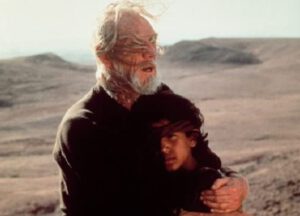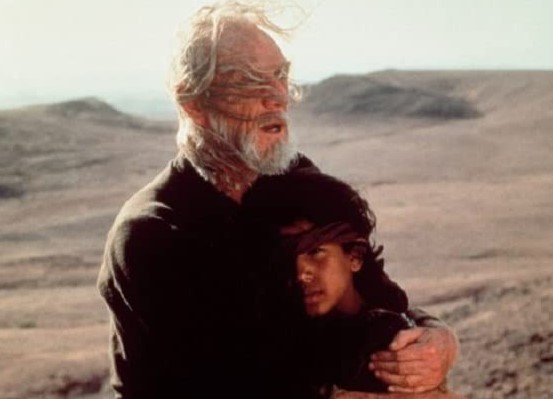Movie Info
Movie Info
- Director
- David Helling
- Run Time
- 1 hour and 46 minutes
- Rating
- PG-13
VP Content Ratings
- Violence
- 1/10
- Language
- 1/10
- Sex & Nudity
- 2/10
- Star Rating
Relevant Quotes
After these things God tested Abraham. He said to him, “Abraham!” And he said, “Here I am.” 2 He said, “Take your son, your only son Isaac, whom you love, and go to the land of Moriah and offer him there as a burnt offering on one of the mountains that I shall show you.”
Just as Abraham “believed God, and it was reckoned to him as righteousness,” so, you see, those who believe are the descendants of Abraham. And the scripture, foreseeing that God would reckon as righteous the gentiles by faith, declared the gospel beforehand to Abraham, saying, “All the gentiles shall be blessed in you.” For this reason, those who believe are blessed with Abraham who believed.

Writer/director David Helling tackles one of the most difficult stories in his first feature film, the Genesis story of God’s command to Abraham to sacrifice his only son Isaac. I remember this story coming up in the Liam Neeson-Meryl Streep film Before and After in which Neeson plays a father covering up for his son in a murder case by destroying evidence, and he justifies his act by telling his wife the story of Abraham and Isaac. With great scorn he says, “Very obedient, Abraham. Very righteous. Who would want him for a father!?”
Lebanese actor Nicolas Mouawad’s Abraham is very obedient but also very troubled after God visits him and he agrees to God’s command to make the three-day trip to Moriah and sacrifice the teenage boy. Sarah (Sara Seyed), his wife is clearly disturbed by this sudden trip, even though her husband has not revealed to her the details of his mission.
Helling’s script conjectures a lot about the conversations between the elderly patriarch and the two servants he brought along with himself and Isaac. And it definitely shows an agonized father questioning God. Along the way there are flashbacks that fill us in on past incidents in his life, such as his call from God to leave his ancestral home in Ur and take up the life of a nomad. His wife Sarai at that time was worried that he spoke blasphemy against their old gods, but he reassures her. There is the promise from God that he will be the father of many nations that will be blessed because of him. Sarai at times experiences anguish because she fails to produce a son, hence her suggestion that Hagar her slave become a surrogate mother for her. Of course, eventually Isaac is born, and her anguish turns to joy.
At Moriah father and son leave the servants behind and trek to the spot where they build a crude stone altar. Isaac asks the traditional question as to where is the lamb for the sacrifice and Abraham replies that the Lord will provide it. Then he confesses to the lad that the boy is to be the sacrifice, and the youth follows his father’s lead by accepting this as God’s will. Far from resisting, the youth allows himself to be tied up and laid upon the altar.
Even though we know the outcome, that the ram is close by, caught in a bush, Mouawad depicts so well the torment of the father that we feel the tension of the moment, the dagger held high over the youth’s breast.
This story has been told magnificently in the Turner Bible Collection film Abraham, with such unbeatable performances by Richard Harris and Barbara Hershey as the patriarch and his wife that one might ask why produce another version of the story? Judging by Helling’s introduction seen at the beginning of the film and the, after the end credits, his pitch for support in producing more Bible films, I think he would say that it is because he wants the audience to see unmistakably the connection of this story with Jesus of Nazareth.
Helling is following in the footsteps of theologians and artists ever since the apostle Paul wrote his letters claiming that Christ is the culmination of the formation by God of a new people by whom all the nations of the earth will be blessed. In the earliest Christian murals painted in the catacombs, there are depictions of Abraham about to sacrifice Isaac, a subject taken up by artists throughout the history of the church.
Helling offers many parallels or connections with Jesus in his film. We see a closeup of Abraham tearing bread, which sems like a Eucharist scene, the patriarch even speaking of remembering. Just prior to his lifting up his knife there is a touch of Christ’s anguished prayer in Gethsemane when the old man says , “Not my will but His be done.” The film ends with the father and freed son at the altar, with the words of God’s promise that “all nations will be blessed” imposed over them. The screen fades to black, and the Crucifixion scene appears, a Roman soldier declaring that the man on the central cross surely is the son of God. Then John 3:16 comes into view for a moment, with first words of the verse vanishing, leaving just the last 3, “his only son.”
Thus, from the standpoint of many in the audience this is a film for the faithful–those who agree that the so-called Old Testament is the prelude or base story that is fulfilled by Christ The Turner film is a visual adaptation of an ancient story with the audience left to make up their own minds about its meaning.
In one way I think the older film is truer to the spirit of the Genesis account. Helling’s film is relentlessly serious. No laughter in this film, the writer leaving out the original laughter during the visit of the mysterious three guests. First, Abraham laughs at the absurdity of the chief one’s promise that by their next visit Sarah will bear a son, and then Sarah herself inside the tent is laughing at the ridiculous idea that a couple as old as they would give birth to a son. And then she denies it when the visitor accuses her of laughing and declares that the boy’s name will be Isaac, which in Hebrew meant “she laughs. ”It’s a pity the new sober film omits the couple’s reaction.
The new film is nonetheless worth watching, the beautiful cinemaphotography and music enhancing the solid performances of the actors. It is a story of faith and obedience ever new, and baffling at worst or challenging at best. If you stay for the series of New Testament passages affirming Jesus as the Christ and then the director himself explaining his plan for producing more films of stories from the Old Testament, you might not be moved to contribute to his cause, but you will have to admire him and his plans. Like Abraham, this film probably will be a blessing to many nations.
Note: Be sure to see the review of Abraham later in this issue.
This review will be in the May issue of VP along with a set of questions for reflection and/or discussion. If you have found reviews on this site helpful, please consider purchasing a subscription or individual issue in The Store.

